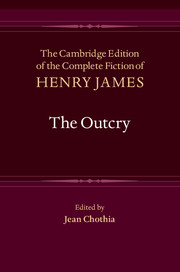Book contents
- Frontmatter
- Contents
- Illustrations
- Acknowledgments
- Abbreviations
- General Editors’ Preface
- General Chronology of James’s Life and Writings
- Introduction
- Textual Introduction
- Chronology of Composition and Production
- Bibliography
- The Outcry
- Book First
- Book Second
- Book Third
- Glossary of Foreign Words and Phrases
- Notes
- Textual Variants
- Emendations
- Appendices
IV
Published online by Cambridge University Press: 11 April 2021
- Frontmatter
- Contents
- Illustrations
- Acknowledgments
- Abbreviations
- General Editors’ Preface
- General Chronology of James’s Life and Writings
- Introduction
- Textual Introduction
- Chronology of Composition and Production
- Bibliography
- The Outcry
- Book First
- Book Second
- Book Third
- Glossary of Foreign Words and Phrases
- Notes
- Textual Variants
- Emendations
- Appendices
Summary
LADY GRACE had turned to meet Mr. Hugh Crimble, whose pleasure in at once finding her lighted his keen countenance and broke into easy words. “So awfully kind of you—in the midst of the great doings I noticed—to have found a beautiful minute for me.”
“I left the great doings, which are almost over, to every one's relief, I think,” the girl returned, “so that your precious time shouldn't be taken to hunt for me.”
It was clearly for him, on this bright answer, as if her white hand were holding out the perfect flower of felicity. “You came in from your revels on purpose—with the same charity you showed me from that first moment?” They stood smiling at each other as in an exchange of sympathy already confessed—and even as if finding that their relation had grown during the lapse of contact; she recognising the effect of what they had originally felt as bravely as he might name it. What the fine, slightly long oval of her essentially quiet face—quiet in spite of certain vague depths of reference to forces of the strong high order, forces involved and implanted, yet also rather spent in the process—kept in range from under her redundant black hat was the strength of expression, the directness of communication, that her guest appeared to borrow from the unframed and unattached nippers unceasingly perched, by their mere ground-glass rims, as she remembered, on the bony bridge of his indescribably authoritative (since it was at the same time decidedly inquisitive) young nose. She must, however, also have embraced in this contemplation, she must more or less again have interpreted, his main physiognomic mark, the degree to which his clean jaw was underhung and his lower lip protruded; a lapse of regularity made evident by a suppression of beard and moustache as complete as that practised by Mr. Bender—though without the appearance consequent in the latter's case, that of the flagrantly vain appeal in the countenance for some other exhibition of a history, of a process of production, than this so superficial one.
Information
- Type
- Chapter
- Information
- The Outcry , pp. 27 - 34Publisher: Cambridge University PressPrint publication year: 2016
